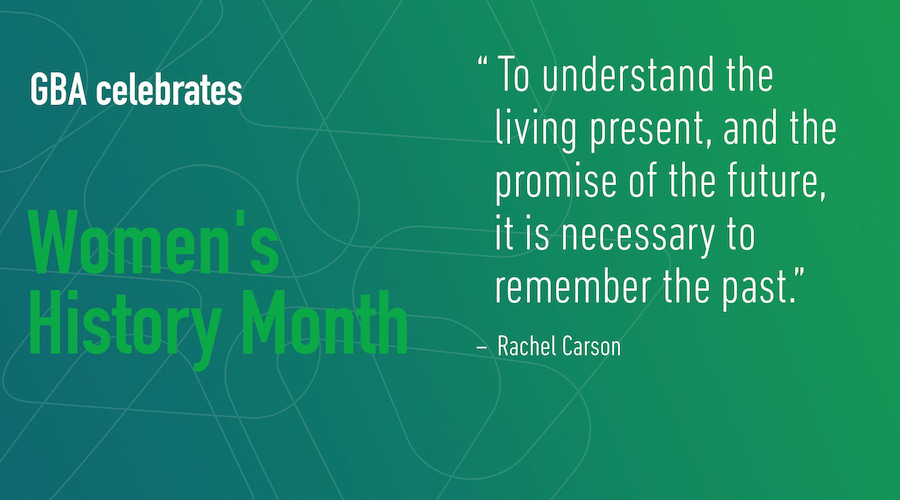Celebrating Women+ Leaders in Sustainability
In honor of Women’s History Month, GBA celebrates the significance of the following women+ and their contributions to the environmental movement, local and sustainable economic systems, and the health and justice of all people.
In honor of Women’s History Month, GBA celebrates the significance of the following women+ and their contributions to the environmental movement, local and sustainable economic systems, and the health and justice of all people.
These women+ see the interwoven connections among the natural and built environment, human health, economic development, and social justice – and they understand that solutions must be holistic and inclusive. All of the women+ on this list have worked tirelessly to make our world prosperous for future generations and to create communities where every person can thrive.
Rachel Carson
Born in Southwestern Pennsylvania, Rachel Carson was a prolific environmental writer who helped launch the modern environmental movement. She began her literary career penning informational pamphlets on ecological topics for the U.S. Fish and Wildlife Service, but her writing style became more artistic with the publication of her books “The Sea Around Us” and “The Edge of the Sea.” Carson’s 1962 book “Silent Spring,” where she decries human exploitation of the environment, is considered a classic work of environmental literature.
To learn more about Rachel Carson and her work, visit the U.S. Fish and Wildlife Service website or the National Women’s History Museum site.
Teresa Heinz
Teresa Heinz is the figurehead of Heinz Endowments, where she has championed green building and sustainable development in Pittsburgh and beyond for many years. Her work has been extremely influential to the founding and success of GBA. She also founded the annual Heinz Awards, which honors organizations making sustainable change in various industries, including the arts, the economy, and technology. Recognizing the importance of empowering women in sustainability, Heinz frequently supports conferences that equip women with crucial knowledge about the intersection between the environment and human health. In 2003, GBA awarded Teresa Heinz an honor of her own, presenting her with the “Shades of Green” award for her contributions to the region’s sustainability leadership.
To learn more about Teresa Heinz, visit the Heinz Endowments and Heinz Awards websites.
“ To be whole. To be complete. Wildness reminds us of what it means to be human, what we are connected to rather than what we are separate from. ”
Terry Tempest Williams
Wangari Maathai
Before Wangari Maathai became a renowned conservation activist, she was earning her master’s degree at the University of Pittsburgh! As the founder of Kenya’s Green Belt Movement, she empowered women to combat deforestation and economic instability by planting and cultivating trees. The growing tree root systems would prevent erosion and provide food and fuel to the community and enabled local women to earn an income for their agricultural work. Maathai’s work earned her a Nobel Peace Prize in 2004, and she was also named a UN Messenger of Peace while serving on commissions and attending special sessions for the United Nations. She worked to combat the privatization of land until her death in 2011.
To learn more about the life and work of Wangari Maathai, visit the websites of the Wangari Maathai Foundation and the Green Belt Movement.

Margaret Thomas Murie
Often called “the grandmother of the conservation movement,” Margaret Thomas Murie was a staunch advocate for protecting America’s wilderness. She successfully fought to preserve over 100 million acres of land in Alaska through the Alaska National Interest Lands Conservation act in 1980. She earned both an Audubon Medal and a Presidential Medal of Freedom for her tireless conservation efforts.
Vandana Shiva
Vandana Shiva is an environmental scholar and activist who fights to empower women-owned farms by promoting fair-trade and organic practices. She strongly advocates for agricultural biodiversity in India through her Navdanya Research Foundation for Science, Technology and Ecology, which maintains seed banks throughout the country. This resource prevents the crop vulnerability that can result from a lack of seed diversity and reduces the need to use environmentally harmful pesticides or chemicals. Shiva has also authored numerous works condemning the power held by major corporations that have negatively impacted the environment.
“ I’ve always believed that one woman’s success can only help another woman’s success. ”
Gloria Vanderbilt
Janine Benyus
Janine Benyus is considered a pioneer in the practice of biomimicry, which is the incorporation of natural structures and systems into the built environment. She is a co-founder of Biomimicry 3.8, a consulting agency specializing in biomimicry that has worked with numerous organizations to build sustainable products based in natural processes. Benyus also co-founded The Biomimicry Institute, which serves as a resource hub for the practice of biomimicry. She is a member of the US Green Building Council’s Board of Directors, and most recently, spoke at COP26 in November 2021 to emphasize the importance of nature when seeking solutions to the climate crisis.
To learn more about Janine Benyus and her work, visit the Biomimicry Institute and Biomimicry 3.8.

Winona Laduke
A member of the Anishinaabekwe Ojibwe nation of Mississippi, Winona LaDuke strives to develop existing food and energy systems into innovative models of local sustainable production. Through the Indigenous Women’s Network that she created, she focuses on promoting and empowering Indigenous women to seek leadership roles in their communities. Another organization she has founded, the White Earth Land Recovery Project, reclaims reservation land so that Indigenous people can economically benefit from it. The repurchased land becomes the site of other sustainable development initiatives, including renewable energy production and local food production for the community.
To learn more about Winona LaDuke, visit the National Women’s History Museum and Honor the Earth.
“ Climate change is a man-made problem and must have a feminist solution. ”
Mary Robinson, UN Rights Commissioner
Malala Yousafzai
Malala Yousafzai is a human rights activist who focuses on increasing access to education for women and girls globally. Growing up in Pakistan under the Taliban regime, she and other girls were not allowed to attend school, and she expressed these frustrations in the anonymous blog she wrote for the BBC. Yousafzai became known worldwide when she was shot in the head by the Taliban in 2012. After recovering, she created the Malala Fund and traveled globally to visit other female students who were also not allowed to go to school, later receiving a Nobel Peace Prize for her work.
To learn more about Malala Yousafzai’s work, visit the Malala Fund website and the National Women’s History Museum website.
Rose Brewer
A professor at the University of Minnesota, Rose Brewer has authored numerous works on environmental racism, Black feminism, and the prison-industrial complex, among other topics. She advocates for the reconnection of people to the land and a transfer of power from large corporations back to individuals. Brewer is also chair of the board of Environmental Justice Advocates of Minnesota, working to promote environmental justice and local sustainable communities.
LaDonna Redmond
LaDonna Redmond is a food justice advocate based in Chicago who has fought for equal access to nutritious food in her neighborhood and school district. She has created a community network, the Campaign for Food Justice Now, to fight for national reform of the agricultural system.
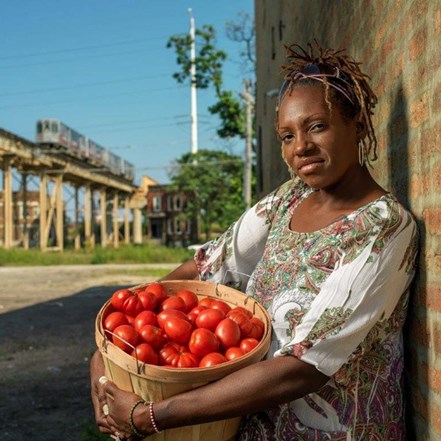
Terry Tempest Williams
As an activist and author, Terry Tempest Williams demonstrates how environmental issues also become social justice issues. In the past, she has advocated for women’s health policy on a federal level by testifying before Congress. She is currently a writer-in-residence at Harvard Divinity School.
Isatou Ceesay
Isatou Ceesay has implemented sustainable waste management practices into her native Gambia. Through her organization Women’s Initiative Gambia, women are trained in upcycling waste into goods such as bags and purses that they can sell to bring in income for their communities.
Majora Carter
Majora Carter is a consultant and developer who advocates for green infrastructure opportunities in historically disenfranchised communities. She has launched numerous building projects in Brooklyn and the Bronx, including a maker space, a tech startup, and a mixed-use riverfront development. Carter was awarded a MacArthur Genius Grant in 2005 and has also spoken at GBA’s Inspire Speaker Series.
To learn more about Majora Carter, visit the Majora Carter Group website.
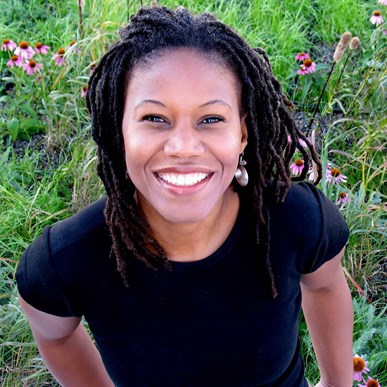
Deb Haaland
As the first Native American to serve as a federal cabinet secretary, Deb Haaland champions causes such as environmental justice, climate change, and pursuing justice for missing and murdered Indigenous women. Her influence on politics in her home state of New Mexico stems from her time as chairwoman of the state’s Democratic Party, as well as the chairwoman of the party’s Native American caucus. She also advocated for sustainable development as the first woman elected to the Laguna Development Corporation’s Board of Directors. Before being appointed to President Biden’s cabinet, she was a member of the House of Representatives, where she served on multiple committees related to natural resources and the rights of Indigenous people.
To learn more about Deb Haaland, visit the U.S. Department of the Interior’s website.

Helen Clay Frick
According to local lore, Helen Clay Frick spearheaded the creation of Frick Park by asking her father for the property to give to the children of Pittsburgh. She developed an additional nature preserve in New York and was known for her love of the wilderness and empathy for social causes.
To learn more about Helen Clay Frick, visit the Frick Collection website.
Marjory Stoneman Douglas
The Everglades remains a protected and beloved nature preserve because of the work of Marjory Stoneman Douglas. Her early work as a reporter for the Miami Herald enlightened her to social justice causes. In 1947, her book about the Everglades was published, and its national park opened. Stoneman Douglas founded and led the Friends of the Everglades to hold elected officials accountable to their promises of conservation. Her environmental stewardship led to her receiving a Presidential Medal of Freedom in 1993.
To learn more about Marjory Stoneman Douglas and her work with the Everglades, visit the National Parks Service website and the Friends of the Everglades website.
Fannie Lou Hamer
Fannie Lou Hamer was a civil rights activist who worked to make land ownership attainable for Black Americans. She also fought for Black Americans’ right to vote, co-founding the Mississippi Freedom Democratic Party and assisting with the coordination of the Freedom Summer in 1964. She bought 640 acres of farmland for Black farmers to purchase and began launching businesses on the property to further stimulate the local economy.
To learn more about the work of Fannie Lou Hamer, visit the National Women’s History Museum website.
“ I am not free while any woman is unfree, even when her shackles are very different from my own. ”
Audre Lorde
Leah Thomas
Leah Thomas advocates for an inclusive environmental movement through education, sharing of resources, and content creation for the digital age. She coined the phrase “intersectional environmentalism” to emphasize the need to consider all groups of people in the environmental movement. Her platform, The Intersectional Environmentalist, provides educational materials and media about various sustainability issues through the lens of justice and equity.
To learn more about Leah Thomas and The Intersectional Environmentalist, visit Green Girl Leah and Intersectional Environmentalist.
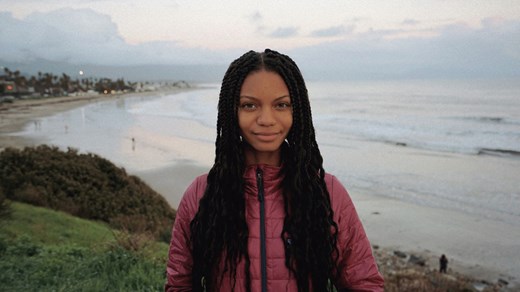
Katlego Kai Kolanyane-Kesupile
A speaker at GBA’s Women+ In Green breakfast last year, Katlego Kai Kolanyane-Kesupile is a changemaker in the human rights, education and performing arts fields. With global experience as a development practitioner, her approach to inclusion and diversification is informed by decoloniality, Feminism, and Disability theory in practice. She is passionate as a vocal advocate for human rights and equality for LGBT+ people globally as Botswana’s first openly trans-identifying public figure.
To learn more about Katlego Kai Kolanyane-Kesupile, visit her website.
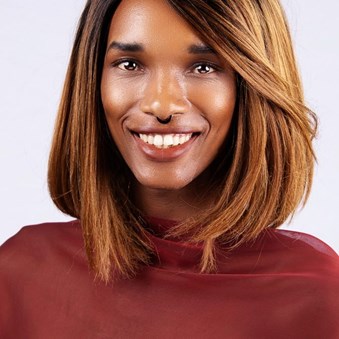
Amplifying the voices of women+ will help lift the voices of all people. GBA is proud to celebrate the phenomenal women+ in this list and those within our own community who are fighting for a more sustainable and just future – where every building and every community is sustainable so that every person can thrive.
“ Each time a woman stands up for herself, without knowing it possibly, without claiming it, she stands up for all women. ”
Maya Angelou

